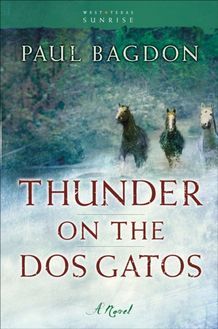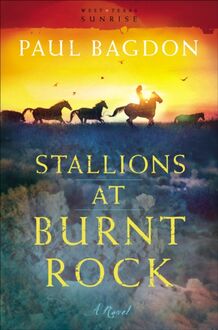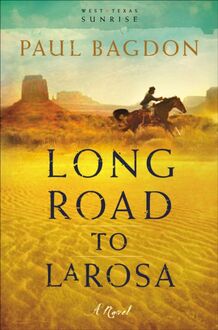Thunder on the Dos Gatos (West Texas Sunrise Book #4) , livre ebook
77
pages
English
Ebooks
2003
Vous pourrez modifier la taille du texte de cet ouvrage
Obtenez un accès à la bibliothèque pour le consulter en ligne En savoir plus
Découvre YouScribe en t'inscrivant gratuitement
Découvre YouScribe en t'inscrivant gratuitement
77
pages
English
Ebooks
2003
Vous pourrez modifier la taille du texte de cet ouvrage
Obtenez un accès à la bibliothèque pour le consulter en ligne En savoir plus
Publié par
Date de parution
01 octobre 2003
Nombre de lectures
0
EAN13
9781441239525
Langue
English
Publié par
Date de parution
01 octobre 2003
Nombre de lectures
0
EAN13
9781441239525
Langue
English
© 2003 by Paul Bagdon
Published by Revell a division of Baker Publishing Group P.O. Box 6287, Grand Rapids, MI 49516-6287 www.revellbooks.com
Ebook edition created 2012
All rights reserved. No part of this publication may be reproduced, stored in a retrieval system, or transmitted in any form or by any means electronic, mechanical, photocopying, recording, or otherwise without the prior written permission of the publisher and copyright owners. The only exception is brief quotations in printed reviews.
ISBN 978-1-4412-3952-5
Library of Congress Cataloging-in-Publication Data is on file at the Library of Congress, Washington, D.C.
This novel is for my partner, Linda Toole just as all the rest of them have been, and the future ones will be.
Contents
Cover
Title Page
Copyright Page
Dedication
Prologue
Chapter 1
Chapter 2
Chapter 3
Chapter 4
Chapter 5
Chapter 6
Chapter 7
Chapter 8
Chapter 9
Chapter 10
Author’s Note
About the Author
Other Books by Author
Prologue
The wood and steel bridge over the Dos Gatos River about twenty-five miles from Burnt Rock, Texas, should have lasted far longer than it did. With good periodic maintenance and no major catastrophes such as floods, hurricanes, lightning, or arson-generated fires, it may have lived long enough to celebrate its seventy-fifth or even one-hundredth birthday. It didn’t, however the bridge went down on April 15, 1881.
The West Texas Rail Road’s scouts had determined that the lazy little burg of Burnt Rock was ideally located to handle huge numbers of beef, if only there was a bridge over the Dos Gatos. The town was already established as a farming community, and the main street of Burnt Rock was growing rapidly. There was a large mercantile, a blacksmith and livery operation, a café, a feed mill, and, unfortunately, a saloon, where gambling and drunkenness were not only permitted but encouraged. There was also a U.S. marshall’s office occupied by lawman Ben Flood, who began his tenure a few years after the surrender of the Confederacy at Appomattox.
Silas Legg, a surveyor, architect, and builder in Burnt Rock, was awarded the contracts for the railroad depot and station in town and the elaborate maze of fences and gates of the stockyard. He also was selected to build the bridge over the Dos Gatos. It was agreed around town that Silas was as crooked as he was incompetent, and that he’d purchased the tremendously lucrative contracts from a dishonest crony in the employ of the railroad.
The laborers were confused, non-English-speaking Chinese men supplied by unscrupulous contractors both white and Chinese. The workers were paid $1.20 per week, for six-and-a-half ten- to twelve-hour days. A percentage of the laborers’ pay was tendered in scrip created by Silas Legg, scrip that could be used only at the store Legg and the labor contractors established near the bridge site.
Silas Legg, it must be admitted, knew his larcenous trade well. He buttressed cheap, inferior materials with good, standard-grade supplies where it was absolutely necessary to keep the structure standing.
The real wonder of the bridge over the Dos Gatos is that it remained standing for the eleven months that it did.
1
Lee Morgan’s days always started early. The merest speck of light in the east set off the three roosters of Maria, wife of her ranch manager, Carlos, and the broodmares and other horses housed in stalls overnight began snorting for feed as soon as the birds greeted the day. The horses in the pastures began drifting toward the gates of the fences, impatiently awaiting the sweet hay that soon would be forked from a flatbed by sleepy-eyed ranch hands.
This morning, the scent of smoked ham, fried potatoes, and chicory coffee wafted from Maria’s kitchen. The crew wandered in to breakfast, scratching themselves, rubbing their eyes, yawning, or quietly discussing the day’s work.
Lee stood next to Maria as Maria filled the plates and mugs of the ranch hands. They filed past her, their sleepiness washed away by the savory fragrance of the meal, and then headed outside with their plates. During the winter and through any spells of bad weather, the men ate in shifts in the kitchen, but on this fine early summer day, they preferred to breakfast outside, sitting on the ground in small groups.
“I’m going to ride over to the back pasture this morning,” Lee said. “I want to check the fences and see if those geldings Carlos put out there are getting along and make sure the mares are okay too.”
“You’ll ride Sleek, no? Ees funny how you always find a job that puts you on the back of that horse,” Maria said.
“Slick’s the finest stallion in Texas,” Lee answered with a grin. “He needs a little exercise once in a while.”
Maria snorted. “Horses, horses, horses. Thass all I hear round here. Horses, they’re as bright as cheekens an’ a whole lot more trouble.”
“Hard to saddle one of your roosters, though. And those chickens give out after half a day’s work. How about this: When Carlos comes back from La Quatro with our new stallion, we’ll put him to training chickens for range work, okay?”
“Carlos ees as loco about horses as you, Lee. Two days he ees gone to pick up thees new one, an’ then he’ll spend all his time with it, no? Don’ you an’ him know I need my husband round to keep me warm at night?”
Maria put her hands on her hips and tried to look stern, but in a moment, both women were laughing.
The main barn was still cool and night-humid, although the sun was beginning to manifest its early summer strength. The horses in the stalls had their muzzles buried in the grain boxes solidly attached to the heavy boards of the stalls and were munching their crimped oats contentedly, occasionally shifting their hooves as they ate.
Lee stopped just inside the big barn, allowing her eyes to adjust to the dusky light. She breathed deeply of the aroma of spring hay, clean horses, and creosoted wood.
Slick’s head popped out of a water bucket as Lee approached his stall. Rivulets of fresh water drained from his mouth as he nickered at her.
She worked the latch on the stallion’s stall, stepped inside, and then stood quietly, simply looking at her horse.
Slick was tall approaching seventeen hands and his coat gleamed like polished coal. The long muscles of his legs were well-defined, and his chest was broad, deep, and hard. He was unlike most tall horses, who could appear rangy. The breadth of his rear quarters and chest gave him a solidity and grace rarely encountered in such a large animal. And his eyes the purest black crackled with quick intelligence.
Lee ran her hand the length of Slick’s neck and used her index finger to dig gently at the slight hollow at the base of his ear, a particular source of delight to him. He grunted like a sow in warm mud.
Horses were Lee’s business, and she knew more about them selecting them, breeding them, riding them, and training them than 99 percent of the men who made their livings from the backs of their mounts. Justin Morgan, the legendary horseman single-handedly responsible for beginning the Morgan horse breed, was an ancestor of hers, and she’d grown up on his grandson Noah’s farm in Virginia after the deaths of her parents.
She’d learned everything her uncle Noah knew and maybe even more. Her dream, her goal, was to develop the perfect ranch horse: a hardy, intelligent, sure-footed mount that could work the twelve- and fourteen-hour days required of a cowboy and his horse, and be ready for another day the next morning. Slick was Lee’s foundation stallion at the Busted Thumb Horse Farm, and the best, brightest, and fastest horse she’d ever owned.
Lee saddled and bridled Slick and led him from his stall to the outdoors. The temperature had crept up during the twenty minutes she’d spent in the barn. She could tell the day was going to be a hot one.
Lee looked at the sky above her, a cerulean blue expanse unflawed by even a snippet of cloud. The air tasted thick with humidity, and she had barely mounted when tiny streams of sweat appeared on her forehead from under her Stetson. She cantered Slick along a path leading to the back pastures, waving to her ranch hands as she passed. Slick broke a healthy sweat before they were out of sight of the barn.
The prairie ahead of Lee appeared to spread out to forever. The pastures, fenced with smooth wire stretched between stout posts dug into the ground every fifty feet, seemed silly in their size, mere minuscule drops of water in an infinite ocean when contrasted with the open land beyond.
Soon the chambray shirt Lee was wearing stuck to her back like a sodden blanket. She tugged off her Stetson and wiped her forehead with a tattered bandana from the pocket of her culottes.
As she sat there for a moment, Ben Flood drifted into her mind. She could feel a smile spread over her face at the thought of him. She was sure of his love for her and sure of his integrity as a Christian and as a man. But the fact that he carried a gun and lived an often violent life frightened her. And she had difficulty reconciling his work as a lawman a Texas marshall with a Christian outlook. Still, she realized how important law was in the West, how the good and honest people needed a defender against the outlaws and drifters who rode in and out of towns, looking for nothing but easy and illegal profit and the satisfaction of their whiskey-thirst and salacious urges.
Lee was reining Slick toward a shallow pond where seven of her pregnant broodmares were clustered, cropping at the sweet grass near the shore, when she heard a scream.
She recognized the sound, a high-pitched, chilling squeal that no other animal could duplicate. It was a sound she rarely heard, but she knew the scream was a sure bet a horse was in trouble.
Lee whirled Slick toward a gentle rise that lay between them and the source of the sound. As Slick sprinted up the slope, a chestnut mare,



